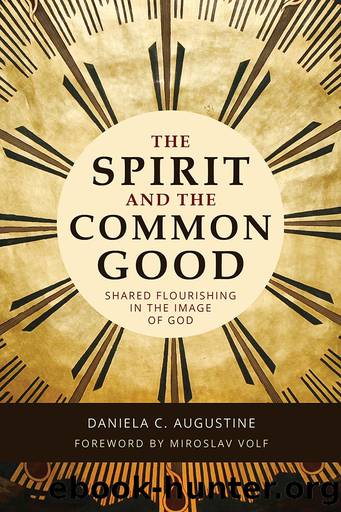The Spirit and the Common Good by Augustine Daniela C.;Volf Miroslav;

Author:Augustine, Daniela C.;Volf, Miroslav;
Language: eng
Format: epub
Publisher: Wm. B. Eerdmans Publishing Co.
The World as Eucharistic Sacrament
If the ongoing human project of world-making has its ontogenesis in Godâs infinite creative energies, then it is not accidental that human life unfolds into a procession of time organized into weeks as a perpetual memorial of the divine creative act. Each time segment of seven days becomes a cosmic echo of that event, resonating within the social fibers of the human community, casting forth all human life as a cultic replica of creation. God creates the world (nature and, arguably, the beginnings of culture) and gifts it to humanity, which in turn creates culture34 by taking nature and adding to it its own life in the form of daily work illumined by creative imagination, which in a limited way recalls the divine creative act. The first seven days of the cosmic time-space continuum become the measure that marks all of time as its internal intentionality and driving principle. Thus, for the cycle of human productivity enwrapped in the liturgical anamnesis of everyday life, the experience of time appears as a sequence of six days of work as worship culminating in the seventh day of ârest as worship.â35 This weekly movement creates a rhythm of life in which human world-making preserves the primordial memory of the cosmos emerging out of nothing as a materialization of the divine will under the bespeaking power of Godâs uncreated energies. Marked by the seven days of divine creation, weekly life becomes a liturgy that evokes the teleological procession of time and matterâfrom eternity toward eternity, from the Spirit toward the Spirit. In its sacramental substance, time guides the world toward its final consummation beyond its own boundaries into a new, never-ending âeighth dayâ that frames the gates of eternityâwhere the cosmos experiences âthe gathering together and transformation of matter into spirit.â36
This understanding of time and matter unveils the sacramental essence of the cosmos as being itself an exquisitely choreographed eucharistic liturgy intended to shape humanity into the likeness of the Creator. By participating in it, human beings learn solidarity with others in the shared cosmic nature that each one of them hypostatizes and yet all have in common. Therefore, as Dimitru Staniloae insightfully suggests,
A separation of cosmic nature taken to the limit between human individuals is impossible. Too great or too unequal a separation of nature brings about war between persons and indeed war within human nature itself or else makes of the latter its slave. Precisely for this reason, everyone is able to contribute to the corruption not simply of a nature that belongs to himself [herself] personally, but also of that nature which belongs to all.37
Therefore, the God-given limitations of the material world are part of the intentional pedagogy of becoming like himâthey press us to share life and grow spiritually out of selfishness into communal solidarity with others (striving for the common good), realizing that the only way matter can meet all existential needs is through the generosity of the Spirit. The liturgical nature of life as
Download
This site does not store any files on its server. We only index and link to content provided by other sites. Please contact the content providers to delete copyright contents if any and email us, we'll remove relevant links or contents immediately.
The Hatha Yoga Pradipika (Translated) by Svatmarama(2497)
Real Sex by Lauren F. Winner(2481)
The Holy Spirit by Billy Graham(2425)
The Secret Power of Speaking God's Word by Joyce Meyer(2257)
The Gnostic Gospels by Pagels Elaine(2034)
Devil, The by Almond Philip C(1906)
23:27 by H. L. Roberts(1895)
Jesus by Paul Johnson(1892)
The Nativity by Geza Vermes(1853)
All Things New by John Eldredge(1786)
Chosen by God by R. C. Sproul(1766)
Angels of God: The Bible, the Church and the Heavenly Hosts by Mike Aquilina(1630)
The Return of the Gods by Erich von Daniken(1578)
Angels by Billy Graham(1555)
Evidence of the Afterlife by Jeffrey Long(1463)
Knowing God by J.I. Packer(1436)
The Gnostic Gospel of St. Thomas by Tau Malachi(1414)
Victorian Sensation by James A. Secord(1410)
How To Be Born Again by Billy Graham(1407)
